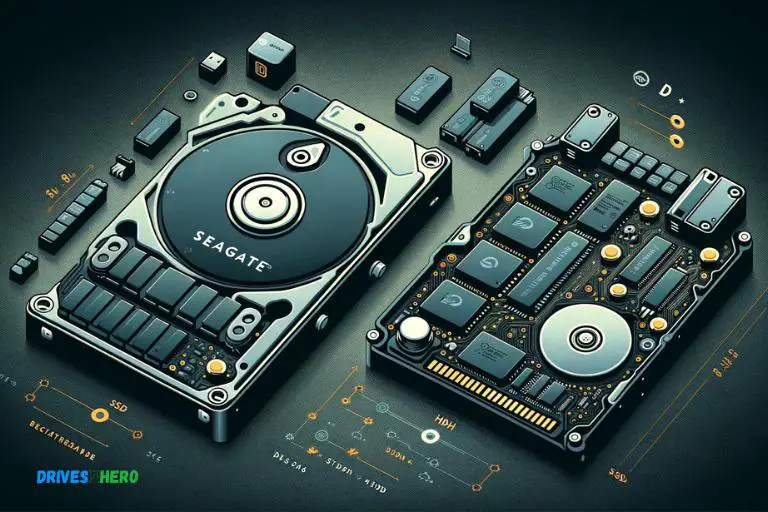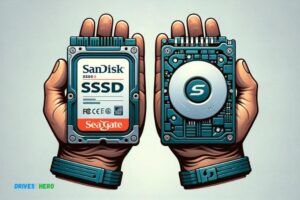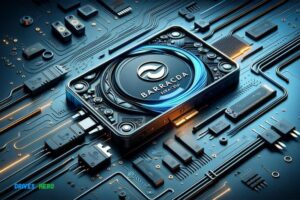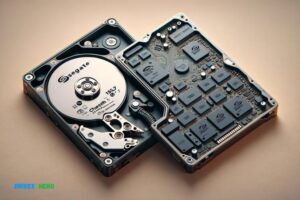Is Seagate Ssd Or Hdd? The Ultimate Guide!
Seagate offers both SSD (Solid State Drive) and HDD (Hard Disk Drive) options tailored to various storage needs, with SSDs providing faster speeds and HDDs offering larger capacity at more affordable prices.
Seagate is a well-known brand in the data storage industry, offering a wide range of storage solutions that include both SSDs and HDDs.
Each type of drive has its advantages:
- SSD (Solid State Drive): Seagate’s SSDs use flash memory to store data, which allows for faster data access and retrieval compared to HDDs. They are more durable due to the lack of moving parts, consume less power, and are quieter.
- HDD (Hard Disk Drive): Seagate’s HDDs use magnetic storage and spinning platters to read and write data. They are cost-effective for storing large amounts of data. HDDs are better for users needing more storage capacity without breaking the bank.
Seagate’s portfolio encompasses robust SSDs for high-performance computing needs and capacious HDDs for extensive storage requirements, catering to diverse user preferences.

Key Takeaway
Performance And Speed Comparison
Seagate SSD and HDD offer different performance and speed levels. SSDs are known for their faster data transfer and quicker access times compared to HDDs, making them a better choice for faster performance and improved overall speed.
Analyzing The Read And Write Speeds Of Seagate Ssds And Hdds
When it comes to choosing storage options, the performance and speed of Seagate SSDs and HDDs are essential factors to consider.
Seagate SSDs:
- Lightning-fast read and write speeds: Seagate SSDs leverage flash memory technology, enabling them to deliver impressive speeds for data access and file transfers.
- Quick boot time: SSDs excel in boot time performance due to their ability to retrieve data rapidly. Your system can be up and running in no time!
- Swift file transfers: With their impressive read and write speeds, Seagate SSDs enable swift data transfers, allowing you to move files quickly and efficiently.
- Solid-state reliability: SSDs have no moving parts, resulting in enhanced durability and resistance to physical shocks. This translates into a low risk of data loss due to accidental impacts or drops.
Seagate HDDs:
- Moderate read and write speeds: While HDDs may not match the lightning-fast speeds of SSDs, they still provide reliable read and write performance.
- Cost-effective storage solution: In terms of capacity per dollar, HDDs offer excellent value, making them an ideal choice for storing large amounts of data economically.
- Suitable for bulk storage: HDDs shine when it comes to storing large files and media libraries due to their generous capacity options.
- Adequate for most applications: Unless you require extremely fast data access, HDDs generally fulfill the requirements for day-to-day computing tasks.
Impact Of Storage Type On Boot Time And File Transfer Speeds
The choice between Seagate SSDs and HDDs can significantly impact boot time and file transfer speeds.
Let’s explore the differences:
Boot time:
- SSDs: With their lightning-fast read speeds, SSDs drastically reduce boot time. Your system can boot up in mere seconds, allowing you to jump straight into your work or entertainment.
- HDDs: Although relatively slower in this aspect, HDDs still offer reasonable boot times. You may experience a slight delay in system startup compared to SSDs, but it is not significant for most users.
File transfer speeds:
- SSDs: With their excellent read and write speeds, Seagate SSDs offer swift file transfers. Whether you’re copying large media files or working with data-intensive applications, SSDs ensure minimal waiting time.
- HDDs: While HDDs may not match the blazing speeds of SSDs, they still provide adequate file transfer speeds for everyday tasks. Copying files and documents won’t take excessively long, though it may be slightly slower compared to SSDs.
If you value speed, performance, and swift data access, Seagate SSDs are an excellent choice.
However, if you require cost-effective storage for larger file libraries and don’t prioritize lightning-fast speeds, Seagate HDDs are a reliable option.
Storage Capacity And Longevity Analysis
The storage capacity and longevity analysis reveals that when it comes to deciding between Seagate SSD or HDD, both options have their advantages.
SSDs offer faster data transfer and improved durability, while HDDs offer larger storage capacity at a lower cost.
Evaluating The Maximum Storage Capacity Of Seagate Ssds And Hdds
When it comes to choosing between Seagate SSDs and HDDs, one crucial factor to consider is the storage capacity. Both options offer varying levels of space to meet your data storage needs.
Seagate SSDs:
- Seagate offers a range of SSD options with different capacities to cater to diverse usage scenarios.
- The maximum storage capacity of Seagate SSDs currently extends up to a whopping 4TB.
- With such a spacious SSD, you can store large quantities of data, including high-resolution photos, videos, and resource-intensive applications.
- Whether you’re a professional photographer, video editor, or a gaming enthusiast, Seagate SSDs can provide ample space to house your sizable digital library.
Seagate HDDs:
- Seagate HDDs are renowned for their bulk storage capabilities, making them ideal for those with extensive storage requirements.
- The maximum storage capacity of Seagate HDDs reaches an impressive 18TB.
- From personal and business data to multimedia content and archives, you can store vast amounts of data without worrying about running out of space.
- If you’re someone who deals with large files regularly, such as architects, graphic designers, or data centers, Seagate HDDs offer the expansive storage capacity you need.
Both Seagate SSDs and HDDs provide substantial storage options. SSDs excel in terms of speed and are available in capacities up to 4TB, making them perfect for individuals who prioritize fast access to their extensive digital content.
On the other hand, HDDs shine when it comes to bulk storage, with maximum capacities of up to 18TB, making them a solid choice for professionals or businesses requiring a large amount of storage space.
Longevity And Lifespan: How Durable Are Seagate Ssds And Hdds?
Aside from storage capacity, it’s important to consider the longevity and lifespan of your chosen storage solution.
Let’s explore the durability of Seagate SSDs and HDDs:
Seagate SSDs:
- SSDs are known for their durability and resistance to physical damage, thanks to their lack of moving parts.
- Seagate SSDs are built to withstand shocks, drops, and vibrations, making them reliable options for users who are frequently on the move or in environments where physical impacts are a concern.
- Additionally, Seagate SSDs have an impressive Mean Time Between Failures (MTBF) rating, indicating their ability to operate reliably for extended periods.
Seagate HDDs:
- HDDs utilize spinning disks and read/write heads, which can make them more susceptible to physical damage compared to SSDs.
- However, Seagate HDDs are designed with durability in mind.
- They incorporate features like shock sensors, which detect sudden movements and protect the drive from potential damage.
- Seagate HDDs have high MTBF ratings, reflecting their reliability and longevity over time.
Both Seagate SSDs and HDDs are built to last and withstand various conditions. Seagate SSDs shine in terms of physical durability, thanks to their lack of moving parts, while Seagate HDDs incorporate technologies to mitigate potential physical damage.
Reliability And Data Security
Seagate offers reliable and secure storage solutions. Choose between their SSD or HDD options for your data storage needs.
Reliability Comparison: Ssds Vs Hdds
When it comes to reliability, both SSDs (solid-state drives) and HDDs (hard disk drives) have their own pros and cons.
Let’s take a closer look at how these storage options stack up in terms of reliability:
SSD Reliability:
- No Moving Parts: Unlike HDDs, SSDs do not have any moving parts, which can make them more reliable since there are no mechanical failures associated with moving components.
- Durability: SSDs are more resistant to physical shocks and vibrations, making them better suited for mobile devices or environments prone to movement.
- Wear Leveling: SSDs utilize wear leveling technology to evenly distribute data writes across their memory cells, prolonging the drive’s lifespan and ensuring consistent performance.
- Lower Failure Rate: SSDs generally have a lower overall failure rate compared to HDDs, making them a reliable choice for data storage.
HDD Reliability:
- Proven Technology: HDDs have been around for a long time and have proven to be fairly reliable in many different scenarios.
- Higher Capacity: HDDs typically offer higher storage capacities compared to SSDs, allowing for more data to be stored on a single drive.
- Cost-Effective: HDDs are generally more affordable than SSDs, making them a popular choice for budget-conscious users.
Data Security And Protection In Seagate Ssds And Hdds
Data security and protection are critical considerations when it comes to choosing a storage solution. Seagate, a renowned manufacturer of both SSDs and HDDs, prioritizes data security in their products.
Here’s what you need to know about data security in Seagate SSDs and HDDs:
SSD Data Security:
- Encryption: Seagate SSDs often come with built-in hardware encryption capabilities that help safeguard sensitive data. They may utilize advanced encryption algorithms, such as 256-bit AES, to protect the contents of the drive.
- Self-Encrypting Drives (SEDs): Some Seagate SSDs are SEDs, which means they have encryption capabilities integrated into their hardware. SEDs can automatically encrypt data as it is being written to the drive, offering an additional layer of protection.
- Secure Erase: Seagate SSDs may feature secure erase functionality, allowing users to securely wipe all data from the drive when it’s no longer needed. This feature ensures data cannot be easily accessed or recovered by unauthorized individuals.
HDD Data Security:
- Secure Erase: Seagate HDDs may also come with secure erase functionality, enabling users to securely erase data from the drive. This feature helps prevent unauthorized access to sensitive information.
- Password Protection: Some Seagate HDDs allow users to set up password protection to restrict access to the drive and its contents. This added layer of security helps prevent unauthorized users from accessing and modifying data.
Both Seagate SSDs and HDDs offer reliable storage solutions, with each having its own unique advantages.
Whether you prioritize speed and durability (SSDs) or cost-effectiveness and higher capacity (HDDs), Seagate provides data security features to protect your valuable information.
Which Storage Option Is Right For You?
Discover which option is right for you based on speed, reliability, and capacity. Make an informed choice for your storage solution.
Factors To Consider When Choosing Between Seagate Ssd And Hdd:
- Speed: SSDs, or Solid State Drives, offer lightning-fast read and write speeds compared to traditional HDDs, or Hard Disk Drives. This means that your computer or device will boot up faster, applications will load quicker, and file transfers will be completed in a breeze.
- Capacity: HDDs typically offer larger storage capacities than SSDs, making them a great choice if you have extensive storage needs, such as storing large files, videos, or a vast collection of games.
- Durability: SSDs have no moving parts, making them more resistant to physical shock and less prone to failure due to wear and tear. In contrast, HDDs have spinning disks and read/write heads, making them more vulnerable to physical damage.
- Price: SSDs are generally more expensive than HDDs, especially when it comes to higher capacities. If you’re on a tight budget and storage capacity is your primary concern, an HDD may offer better value for your money.
Determining The Ideal Storage Solution Based On Your Specific Needs:
- If you need a storage option that prioritizes speed and performance, an SSD is the way to go. Whether you’re a gamer who wants fast load times or a creative professional who works with large files, an SSD will provide the snappy performance you need.
- On the other hand, if you require a large storage capacity at a more affordable price point, an HDD is your best bet. This is especially true if you work with media files or need to store large amounts of data.
- If durability is crucial to you, such as if you frequently transport your storage device or work in extreme conditions, an SSD’s solid-state design makes it more resistant to physical damage and ideal for your needs.
- Consider your budget and prioritize your storage needs. If speed is a top priority and you can invest a bit more, an SSD is worth considering.
- If storage capacity is your primary concern and you’re working with a limited budget, an HDD will provide you with ample space at a more affordable price.
Choosing between Seagate SSD and HDD depends on several factors such as speed, capacity, durability, and price. By considering your specific needs and priorities, you can determine the ideal storage solution for you.
Conclusion
When considering whether to choose Seagate SSD or HDD, it is important to assess your specific needs and priorities.
SSDs offer exceptional speed and performance, making them ideal for those who require fast data access and rapid file transfers. They are also more durable, reliable, and silent compared to traditional HDDs.
On the other hand, HDDs provide larger storage capacities at a more affordable price, making them a suitable choice for those who require ample space for storing documents, photos, videos, and other files.
However, they are slower and less energy efficient compared to SSDs. The decision between Seagate SSD or HDD depends on your requirements and budget.






